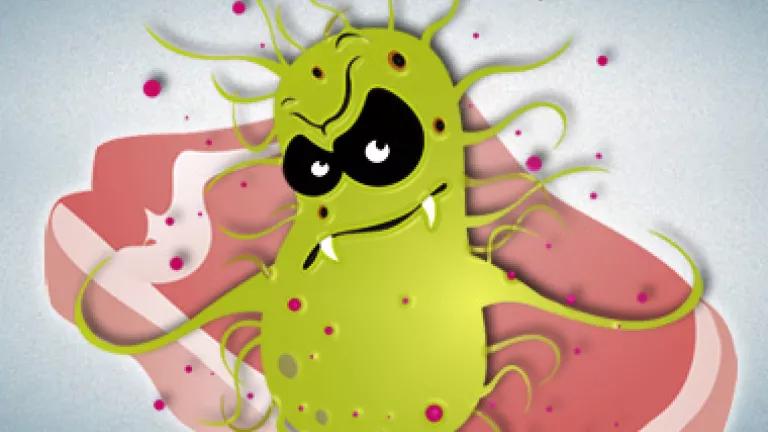
Sometimes a bit of humor is worth a thousand words. Here at NRDC, we’ve written about how the livestock industry employs a strategy of obfuscation—pesky facts be damned!—to try and convince us that their massive and largely unregulated use of antibiotics on factory farms isn’t harming human health and bullying to push their agenda. But these hilarious ads I recently came across make quick work of the issue:
The fact is, today’s livestock industry is addicted to drugs, consuming 80% of the antibiotics sold in the U.S. Yet like the bodybuilder cow with a needle sticking conspicuously out of his “haunch”, they continue to deny that there’s a problem and expect us to buy it.
The dominant meat production model in the U.S. raises millions of cows, pigs, chickens, and other animals in confined animal feedlot operations or “CAFOs”—basically giant factories where animals are crowded together and everything is done to get them as fat as possible as quickly as possible. One way producers accomplish this is by constantly feeding these animals low doses of antibiotics, which both work as supplemental “growth promoters” and compensate for the filthy and stressful conditions in which these animals live out their lives. The vast majority of antibiotic use in livestock operations is for these purposes.
But this isn’t just a story about the health and welfare of our farm animals. This is a story about our health and welfare. And both our medical and scientific communities are on record that there is a clear link between antibiotic use in animals and antibiotic resistance in humans.
When antibiotics are used at non-therapeutic (or sub-therapeutic) levels in CAFOs—i.e. at low levels insufficient to treat disease, meaning millions of animals never “finish the course” the way our doctors admonish us to do when we take antibiotics to treat an infection—they are even more likely to breed dangerous drug-resistant bacteria. These “superbugs” can travel out from livestock facilities in meat, through livestock and meat processing workers who come into contact with contaminated animals or meat, and through environmental pathways such as water, soil, and air that come into contact with contaminated animal waste. “Superbugs” also spread when drug-resistant bacteria share resistance genes with other bacteria.
Infections caused by antibiotic resistant bacteria are harder to treat because antibiotics are less effective against the diseases, leading to longer illnesses, more hospitalizations, the use of stronger or more toxic antibiotics with greater side effects, and death when treatments fail.
NRDC believes the food we eat should be safe and healthy for everyone and should not put essential medicines and our health at risk. Life-saving antibiotics shouldn’t be abused to unnaturally fatten animals so that industrial operations can turn a quicker or bigger profit or to substitute for better management practices to prevent diseases associated with unsanitary conditions.
When an industry is in denial about its problems, it clearly cannot be trusted to police itself. That’s why we need the Food and Drug Administration—the agency responsible for ensuring that antibiotic use in animal agriculture does not threaten public health—to follow court orders to end the dangerous misuse of antibiotics in livestock production. You can join NRDC in pushing the FDA for real action here.
As a consumer, you can also push back on the industry spin. Vote with your dollars and buy meat and poultry raised without antibiotics by looking for these more reliable labels:
- USDA Organic – Adheres to USDA’s organic standards and must be verified on-site by an independent accredited certifier.
- No antibiotics administered or Never Ever Given Antibiotics – This labeling is a company assertion and is typically not third-party certified. It’s helpful, but is more reliable if a “USDA Process Verified” shield accompanies it, which means the company sought USDA approval and USDA has actually verified the label claim.
And avoid these meaningless, non-USDA approved claims:
- Natural
- Antibiotic-free
- No antibiotic residues
- No antibiotic growth promotants
Like the savvy women in these humorous ads, Americans know when we’re being mislead. It’s time to tell FDA and the livestock industry that we want less spin and more meat raised without drugs.
